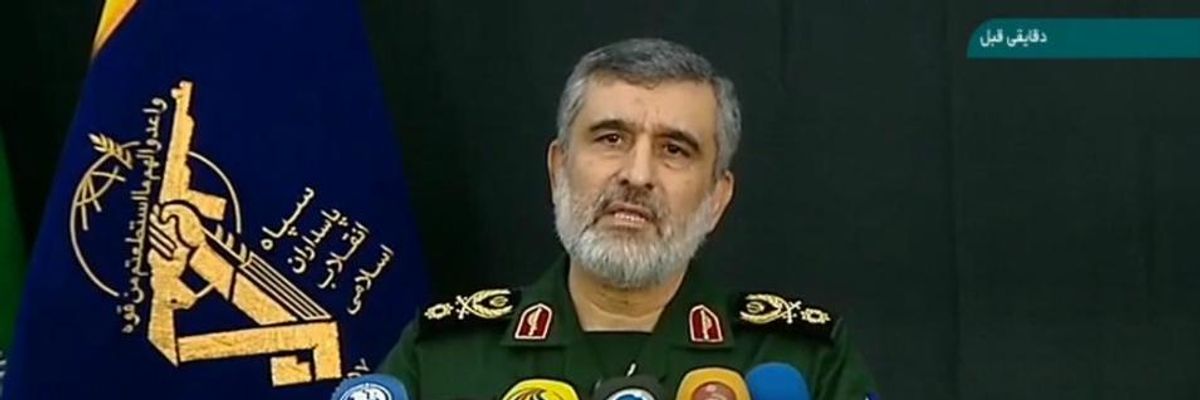Bolstering calls from across the globe for a swift de-escalation of tensions between the United States and Iran--which ramped up after U.S. President Donald Trump ordered the assassination of Iranian Maj. Gen. Qasem Soleimani earlier this month--Iran's military announced Saturday that it had "unintentionally" shot down a Ukraine passenger jet, killing all 176 people aboard.
The admission that Iran downed the Kyiv-bound Ukraine International Airlines Flight PS752, which crashed shortly after taking off from Tehran Imam Khomeini International Airport early Wednesday, confirmed conclusions from various intelligence agencies and followed world leaders' demands for a transparent probe into the tragedy, which left 82 Iranians, 63 Canadians, 11 Ukrainians, 10 Swedes, four Afghans, four Britons, and three Germans dead.
As Common Dreams reported earlier this week amid suggestions from intelligence agencies that the Iranians were responsible for the crash, "even if Iran was shown to have shot down the jetliner, some observers were quick to argue that Trump has the blood of the victims 'on his hands' for touching off the violence with an assassination both he and his top cabinet members knew full well would lead to retaliation from Tehran."
The plane crashed just hours after Iran carried out its official retaliation for the U.S. assassination of Soleimani, firing several ballistic missiles at two Iraqi military bases that host coalition forces, including Americans; that action from Iran did not result in any loss of life. The Associated Pressnoted that "Iranian air-crash investigators, government officials, and diplomats all denied for days afterward that a missile downed the Boeing 737."
In an address broadcast by Iranian state TV Saturday, Gen. Amir Ali Hajizadeh, commander of the Aerospace Division of the Islamic Revolution Guards Corps (IRGC), accepted full responsibility for downing the passenger plane, explaining that a missile operator mistook the jetliner for a hostile target.
Agence France-Presse reported on the commander's address:
Hajizadeh said the missile operator acted independently, shooting down the Boeing 737 after mistaking it for a "cruise missile."
The operator failed to obtain approval from his superiors because of disruptions to his communications system, he said.
"He had 10 seconds to decide. He could have decided to strike or not to strike and under such circumstances he took the wrong decision."
"It was a short-range missile that exploded next to the plane," Hajizadeh added.
Hajizadeh emphasized that Iranian aviation officials who "categorically rejected the possibility of a missile hitting the plane" had "acted based on what they knew," according toIran Front Page journalist Reza Khaasteh, who translated the entire address into English.
"I must say they were not guilty and have nothing to do with this. All the blame is on us; they're innocent," he said, adding that the plane's crew also didn't make any mistakes. "Only one of our forces made a mistake. Since he is under our command, we are responsible for that. We must be accountable."
"We have lost our dear ones, and are sorry," said the commander. "These are after all the price of the mischief, tensions, and measures of the U.S. in the region. At that night, we were totally prepared for a full-fledged war."
Acknowledging the IRGC's admission on Twitter Saturday, Iranian President Hassan Rouhani said: "The Islamic Republic of Iran deeply regrets this disastrous mistake. My thoughts and prayers go to all the mourning families. I offer my sincerest condolences."
"This is a watershed moment for Iran's gov. mainly because we as Iranians are not used to them admitting guilt. Especially on a major issue like this," BBC correspondent Bahman Kalbasi said in a series of tweets that noted Rouhani's remarks. Kalbasi also shared video footage from the response in Iran:
The APreported on world leaders' responses to the news Saturday:
Ukraine's President Volodymyr Zelenskiy said the crash investigation should continue and the "perpetrators" should be brought to justice. He said Iran should compensate victims' families, and he requested "official apologies through diplomatic channels."
[...]
Rouhani spoke Saturday with Canadian Prime Minister Justin Trudeau and said the investigation was progressing rapidly. His website quoted him accusing the United States of driving the situation in the Middle East to a "dangerous level" and said all should try to return "full stability and security" to the region.
Trudeau said his country would remain focused on getting justice, closure, accountability, and transparency for the families.
Iranian Foreign Minister Mohammad Javad Zarif wrote on Twitter Saturday that "my colleagues in the foreign ministry--and in embassies, missions, and consulates worldwide--share the nation's grief in the aftermath of the tragedy and stand ready to offer any needed assistance to families of the victims."
Along with offering "profound regrets, apologies, and condolences" to all the people and nations involved, Zarif called out the United States for its role in escalating tensions, tweeting that "human error at time of crisis caused by U.S. adventurism led to disaster."
Washington Post Beirut bureau chief Liz Sly pointed out that in addition to those killed in the downed plane, dozens of mourners died after a stampede broke out at Soleimani's massive funeral procession in Iran. "The toll of the aftermath of Soleimani's assassination now stands at 232 dead," Sly tweeted. "It has indeed been bloody, but not in the way that had been expected."
Medea Benjamin, co-founder of the U.S.-based anti-war group CodePink, also responded to the news on Twitter. After summarizing the Iranian commander's admission, she said: "Trump bears some blame, don't you think? Tragic collateral damage from his murder of Soleimani. #NoWarWithIran."

